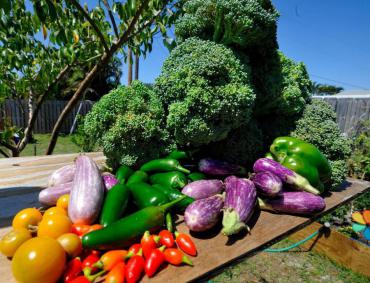Homegrown Harvests During the Badger Bounce Back
A Message from Mayor Rhodes-Conway
While we are all staying home due to COVID-19, interest is surging in home gardening. Many people sheltering in place are looking for things to do to keep themselves – and their kids - occupied.
Comparisons have been made to the Victory Garden initiatives of WWI and WWII, which encouraged people to grow food to support the troops as well as producing fresh vegetables for their own families. All these years later, gardening is still a wonderful family activity that has many benefits. Besides producing home-grown nutritious food, gardening can be a great way to get families outside in the fresh air, and provides good exercise. Whether signing up to be a member of a community garden, using your own front yard or backyard, the terrace between the street and the sidewalk, or containers within your home, there is no shortage of opportunities to grow your own food.
For resources on vegetable gardening, visit the UW-Madison Extension Learning Store https://learningstore.extension.wisc.edu/ to check out publications written by UW-Madison Extension specialists. Publication A1989, The Vegetable Garden, is a great overview that also has many specific details about growing vegetables. There are also a number of other publications that address recommended vegetable cultivars, trellising and caging, square foot gardening, tomato varieties, and other topics. You can view and print them out at home for no cost, or purchase hard copies as desired.
Even without any training, you can have a very successful vegetable garden. Most vegetables need at least 6 hours of light per day, but some greens like lettuce and spinach can tolerate less light, around 4 hours. Lettuce, spinach, and kale are also among the easiest vegetables to grow. They can be grown in regular potting soil in pots indoors year-round in a sunny window, or under grow lights as well as outdoors. Radishes, peas, lettuce, spinach and kale can be started from seed in the garden in mid-late April. Green beans, which can be planted outside at the end of May, are another easy crop to grow.
You don’t necessarily have to have a big garden or lot of space. Some ‘bush-type’ versions of crops like beans, squash, cucumbers and tomatoes can be grown in something as simple as a 5-gallon bucket with holes drilled in the bottom for drainage. You can even grow a ‘pizza garden’ in an old plastic children’s swimming pool if you add some drainage holes.
If you are interested in local classes on vegetable gardening, Dane County Extension holds the Green Thumb Gardening class series on Thursday nights from October-December. You can take the full series, or select specific classes. These are likely to be held online in 2020. Seed starting workshops or lectures (in-person and online) are also offered in spring. Dane County Extension also offers the Master Gardener Volunteer training program, which trains community volunteers in horticulture, on annual basis from February to August.
Happy gardening!
RESOURCES
- City of Madison – Terrace and Yard Plantings
https://www.cityofmadison.com/mayor/programs/food/terrace-and-yard-plant... - City of Madison Edible Landscapes Permit Process
https://www.cityofmadison.com/mayor/programs/food/edible-landscapes-perm... - UW-Madison Extension Learning Store
https://learningstore.extension.wisc.edu/ - The Gardens Network – Find a Garden in Dane County Near You!
https://danegardens.net/ - Grow Your Own Pizza Garden – The Spruce
https://www.thespruce.com/pizza-garden-in-a-container-848243 - Dane County Extension – Green Thumb Gardening Class Series
https://dane.extension.wisc.edu/horticulture/greenthumb/ - Dane County Extension – Master Gardener Volunteer Training Program
https://dane.extension.wisc.edu/horticulture/master-gardener/training/
Contacts
- Katie Crawley, 607-335-7071, kcrawley@cityofmadison.com
